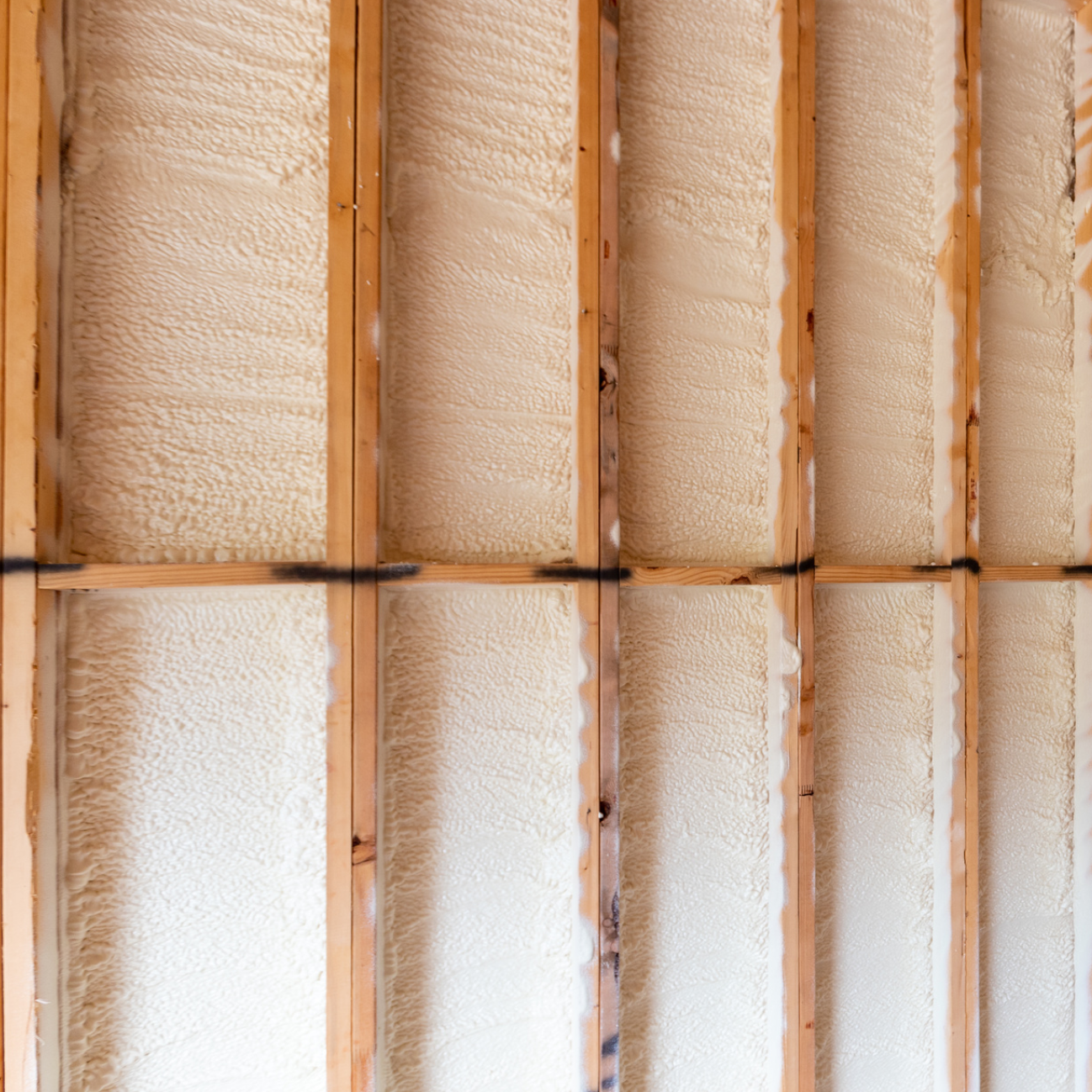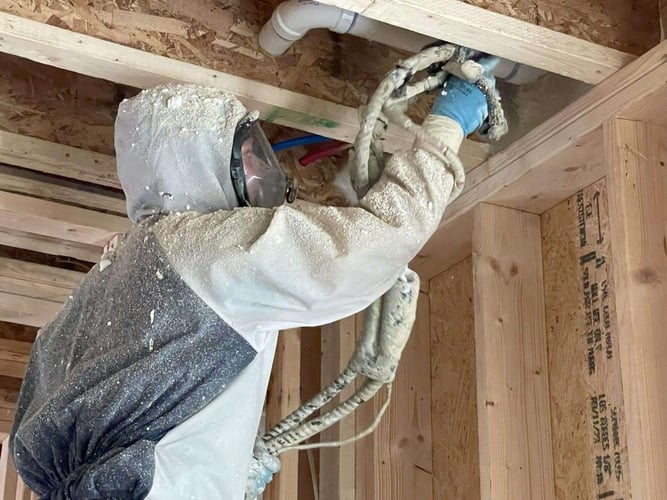Contrasting Spray Foam to Standard Insulation: Which Is Better?
Contrasting Spray Foam to Standard Insulation: Which Is Better?
Blog Article
Spray Foam: The Ultimate Service for Air Sealing and Insulation
Spray foam insulation has emerged as a leading solution for efficient air securing and thermal insulation, providing a distinct combination of residential properties that establish it apart from standard techniques. Comprehending the complete range of its advantages, installation procedures, and contrasts with other insulation kinds is critical for making educated choices.
What Is Spray Foam?
Spray foam is a versatile insulation material that integrates the concepts of air securing and thermal resistance to improve power performance in structures. Made up primarily of polyurethane or other similar substances, spray foam is applied as a liquid that expands upon call with surfaces, producing a solid, constant layer of insulation. This special home enables it to fill voids, fractures, and voids that traditional insulation materials might forget, offering a premium air seal.
There are two major kinds of spray foam: open-cell and closed-cell. Open-cell spray foam is lighter and much more flexible, using outstanding audio absorption and a reduced R-value per inch - Spray Foam. On the other hand, closed-cell spray foam is denser, giving a greater R-value, dampness resistance, and included structural stability to developing components
The application procedure commonly includes specific tools, ensuring a smooth application that abides by various substratums, consisting of wood, metal, and concrete. This adaptability makes spray foam ideal for both new buildings and retrofitting existing structures. Its capacity to create a closed obstacle significantly contributes to minimizing power usage and enhancing interior air quality, thus making it a recommended selection amongst property owners and home builders alike.
Advantages of Spray Foam Insulation
Among one of the most significant advantages of spray foam insulation is its exceptional ability to create a constant air obstacle, which successfully decreases energy loss. Unlike standard insulation products, spray foam broadens to fill up gaps and fractures, making certain that air leak is drastically reduced. This characteristic not just boosts energy effectiveness however likewise results in lower utility costs over time.
Additionally, spray foam insulation provides superior thermal resistance, contributing to an extra secure interior atmosphere. Its high R-value per inch permits for reliable insulation in confined rooms, making it ideal for attics, wall surfaces, and crawl spaces. Additionally, the moisture-resistant buildings of spray foam help avoid mold and mildew development, advertising much healthier living conditions.
Another crucial benefit of spray foam insulation is its sound-dampening high qualities (Spray Foam). It efficiently minimizes noise transmission in between rooms, producing a quieter and more comfortable home setting. The toughness of spray foam additionally stands apart, as it does not sag or resolve gradually, maintaining its performance throughout its life-span
Just How Spray Foam Functions
Understanding how spray foam insulation functions is essential for valuing its efficiency in air sealing and thermal resistance. Spray foam insulation includes 2 main parts: isocyanate and polyol resin. When these elements are blended, they undertake a chemical reaction that creates the material to broaden rapidly, developing a dense foam that fills up splits, dental caries, and gaps.
As the foam expands, it sticks to surfaces, developing a closed seal that significantly decreases air seepage. This particular makes spray foam insulation highly effective at stopping drafts and wetness penetration, which can lead look what i found to energy loss Resources and damage gradually. In addition, the closed-cell version of spray foam offers exceptional thermal resistance because of its stiff framework, successfully decreasing warmth transfer.
The one-of-a-kind residential or commercial properties of spray foam allow it to comply with irregular surface areas, making sure comprehensive protection and a smooth barrier. Because of this, spray foam insulation not only enhances energy efficiency but also contributes to improved interior air top quality by lowering the buildup of irritants and contaminants. Eventually, recognizing the auto mechanics behind spray foam highlights its function as a premium selection for insulation and air securing in both commercial and domestic applications.
Installation Refine Summary

Before installment, the area must be effectively cleaned up and prepped, making sure that surfaces are devoid of wetness, dust, and particles. This action is crucial since pollutants can endanger bond and total efficiency. As soon as the location is prepared, the application involves mixing both parts of the spray foam, which increases upon call and fills gaps properly.
Educated specialists should conduct the installation, making use of specific devices to make sure uniform protection and optimum thickness. Security preventative measures, including using protective equipment and guaranteeing proper air flow, are vital during this procedure. After application, the foam generally remedies rapidly, developing a strong obstacle that boosts power effectiveness.
Comparing Spray Foam to Typical Insulation
When assessing insulation alternatives, spray foam insulation stands out in contrast to typical products such as fiberglass and cellulose. Unlike fiberglass and cellulose, which can enable air seepage, spray foam broadens upon application, filling spaces and gaps to create an impermeable seal.
Furthermore, spray foam gives a higher R-value per inch than conventional insulation kinds, providing even Resources more effective thermal resistance in a thinner profile. This particular is especially useful precede with restricted cavity deepness. Additionally, spray foam is immune to moisture and mold and mildew development, which can be a considerable interest in cellulose and fiberglass, particularly in damp environments.
Nevertheless, spray foam insulation normally lugs a higher in advance expense than its standard counterparts. House owners must evaluate this preliminary financial investment versus long-term energy cost savings and efficiency advantages. Eventually, while both insulation kinds serve their objective, spray foam becomes an advanced service for contemporary insulation needs, especially in terms of air securing and thermal effectiveness.

Verdict
In recap, spray foam insulation represents a very efficient option for accomplishing ideal air sealing and thermal resistance. Its distinct residential properties, consisting of dampness resistance and audio dampening, make it appropriate for different applications in both new buildings and retrofitting projects (Spray Foam). Although the first costs might be greater compared to conventional insulation materials, the lasting advantages, such as considerable energy cost savings and enhanced indoor air quality, justify the financial investment and emphasize its value in modern structure methods.
Spray foam insulation has actually emerged as a leading option for effective air sealing and thermal insulation, supplying a distinct combination of properties that establish it apart from conventional methods.Spray foam is a flexible insulation product that combines the principles of air securing and thermal resistance to enhance power efficiency in buildings.When evaluating insulation choices, spray foam insulation stands out in contrast to conventional materials such as fiberglass and cellulose. Ultimately, while both insulation types offer their function, spray foam emerges as an extra sophisticated remedy for modern insulation requirements, especially in terms of air sealing and thermal effectiveness.
In recap, spray foam insulation represents an extremely reliable solution for accomplishing ideal air securing and thermal resistance.
Report this page